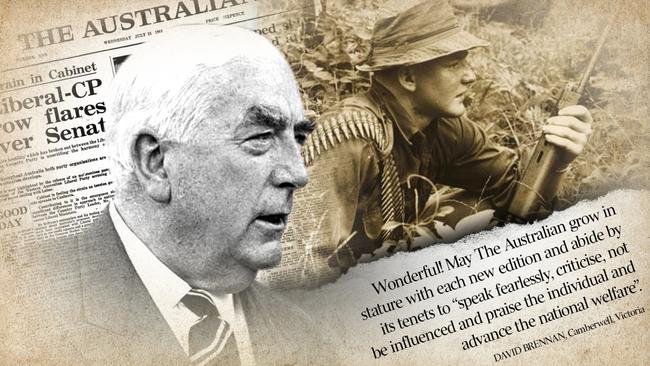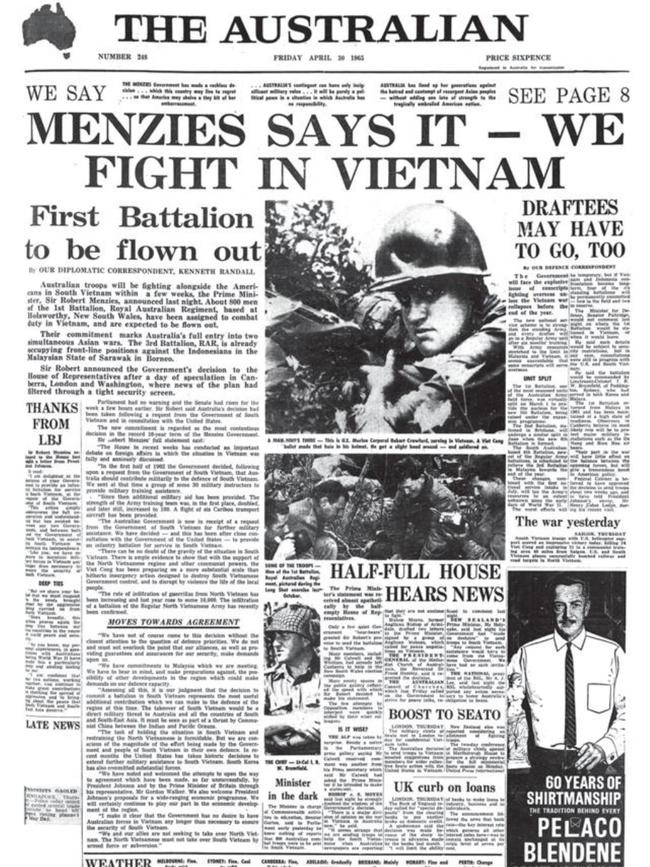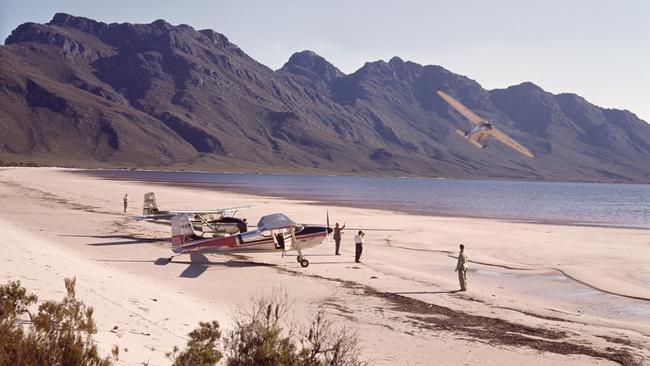
In the 1960s, the paper published the forthright views of maverick one-armed expeditioner and Oxford-educated zoology professor Jock Marshall, who urged basic rights for Indigenous Australians. Well before the 1967 referendum, he pointed out that we must at least know how many Indigenous people there were in Australia, as well as allow people enough agency to work and live their lives without overbearing interference.
On the subject of the Vietnam War, our editorials were clear, sometimes strident but always well argued: we opposed the war and our nation’s involvement in it. As the voice of the masthead, the editorials of the 1960s set the tone for decades to come. Ours would be a strong but well-reasoned contribution to the national debate, free from political interference, guided by what was in the country’s best interests.
Our final selection here from The Australian’s pages of the 1960s will astonish some readers. Back in 1967, we were told that small atomic reactors could be the solution for electricity generation in Tasmania in order to avoid the drowning of Lake Pedder. What a different path that would have taken us on.
With at-times biting cynicism, Jock Marshall wrote that we were condemning Indigenous people to a life of poverty, humiliation and disease. And we were wilfully ignorant of basic information about Aboriginal society. Some of the language will jar with modern readers.
CALLOUS NEGLECT
- By Jock Marshall. First published September 30, 1964

I was packing my bags for South Africa when a friend said: “You’ll find plenty to write about over there – apartheid and all that.”
I expect he was right but I am not sure that, if we had a large [Indigenous] majority, Australians would behave any better than the Afrikaner.
Before we throw too many stones, let us take a sharp look at some of the things that are going on in our own glasshouse.
Although the native people now have the federal vote and a state vote except in Queensland, Aborigines are ruled in an authoritarian, in fact dictatorial, fashion by the settlement boss, missionary or employing cattleman. After treating the Red Indian as badly as our forefathers did the Aborigines, the North Americans made amends with treaties and have from time to time compensated them financially for taking their tribal lands. We have done nothing like this. We stole the land, and told the owners to go to blazes. Later, we put them on reserves of land that we did not want.
In many cases they are still not allowed to buy a glass of beer (it is not good for them). They cannot be given a decent wage (this, too, is not good for them). They still need official permission to draw on their own meagre savings accounts; for example to buy a new saddle. They still need permission to form certain sexual and marital relationships.
It is a startling fact that no one has any real idea how many Aborigines there are. Section 127 of our Constitution prevents Aborigines from being included in the national census. It is probable that there still exist about 43,000 pure-blood Aborigines and perhaps 60,000 people of mixed descent …
However, despite his apathy and unreliability, it is somehow true that the Aboriginal stockman is the backbone of the rich beef industry of Northern Australia. He is often a magnificent natural horseman, an astonishing thing when we remember that his great-grandfather knew no quadruped bigger than a dingo. In the great wide grasslands of the Northern Territory, Western Australia and Queensland, the cattle industry would collapse if he withdrew his services.
One might expect then, that the Aboriginal would be paid something at least vaguely like a fair wage. He is not. In the Northern Territory he is specifically excluded from the Cattle Industry Award and paid the sum of (pounds sterling) 2/8/6 a week, along with his keep.
If the government compelled the rich cattle stations of the Northern Territory to pay their Aboriginal employees a just wage it is said that (a) they would go broke; (b) the Aborigines would be unemployed; or (c) would gamble and (d) would die of “the drink’’. At 2/8/6 a week, one hopes that not too many Aborigines are addicted to wild luxuries such as cigarettes, ice-cream and Coca-Cola.
In Queensland too, the Aborigine is carefully protected from himself. A white station hand is paid 15/3/6 a week but the Aborigine working beside him gets 10. A white drover gets at least 17/9/4 a week, but the Aborigine, however expert, is entitled only to 10.
In a station homestead, a domestic servant gets 11/5/3 if she is white. The black girl, however, is carefully protected from vice by the lower wage of 4/15 a week.

The economic and social conditions imposed on the Aborigines do not give them much chance to achieve decent living standards. In their communities, even near the towns, there is usually inadequate housing, no running water, no sewerage facilities and no garbage disposal.
And so such communities breed diseases that are typical of underprivileged peoples, white or black. Tuberculosis, parasitic infections, ear infections, gastroenteritis, dysentery, infantile diarrhoea and chronic malnutrition. The Aboriginal infant mortality rate is among the highest in the world.
Justifiably harsh foreign criticism of our callous neglect and cynical exploitation of the Aborigines has mounted in post-war years and so the federal vote has been given to them. Some states are making feeble attempts to provide better educational facilities.
All governments are hastily abolishing legislation that is discriminatory – except, of course, that relating to wages.
This year the commonwealth established in Canberra an Australian Institute of Aboriginal Studies. The institute will try to record all aspects of Aboriginal life – archaeology, linguistics, material culture and the like – before it is too late. But incredibly, the institute is specially debarred from researching into the fields of contemporary sociology, welfare and methods of administration.
Our ignorance of Aboriginal sociology, and the best means by which to ensure native advancement, is abysmal.
We settled Australia in 1788. It is now 1964, and remember – we still don’t know how many Aborigines we have left alive.
The Australian’s editorial of April 30, 1965, set out in clear, simple terms the masthead’s opposition to the decision by prime minister Robert Menzies to send our troops to Vietnam. It would soon be confirmed that conscripts, as well as volunteers, would go.
THE WAR THAT CAN’T BE WON
- First published April 30, 1965
The Menzies government has made a reckless decision on Vietnam which this nation may live to regret. It has decided to send Australian soldiers into a savage, revolutionary war in which the Americans are grievously involved – so that America may shelve a tiny part of her embarrassment.
The government has obviously been under strong pressure from the Johnson administration, which has desperately been seeking in these last weeks of military escalation in Vietnam to broaden the international basis of its progressively active policy.
Searching for friends, America has turned to her Anzus and Seato associates in the Western Pacific for at least a meaningful gesture of practical support.
The Australian people will therefore acknowledge the toughness of the problem Sir Robert Menzies and his colleagues have faced, though indeed they were half-way already to direct commitment, being for the most part in wholehearted moral support of the dubious American cause.
Their decision is wrong, at this time, whichever way we look at it.
This is politics
It is wrong because Australia’s contingent can have only insignificant military value, because it will be purely a political pawn in a situation for which Australia has no responsibility whatsoever.
It is wrong because until now, the Australian people have been told – and rightly – that this country’s military commitment to the defence of Malaysia against looming Indonesian aggression is as much as, if not more than, the nation can support.
Is Britain, though she lacks American policy in Vietnam, sending in troops? Is India, under permanent Chinese threat, joining the fight? Is Canada, America’s neighbour, embracing the South Vietnamese cause? The answer in each case is an emphatic no, allied with an urgent desire to see the Vietnam war melt into negotiations.

Seato divided
Neither of the Pacific defence treaties to which Australia subscribes can honestly be invoked to justify the Menzies government’s decision. Anzus cannot apply, because the United States is not under attack. Seato, more worthless than ever, certainly doesn’t apply. Half its reluctant members … are even leaning the other way.
There is another very strong argument against Australia’s getting into the Vietnam fight just at this moment. This stems from current hopes that behind-the-scenes moves in London, Moscow and other capitals may lead to negotiations through the device of returning to the 1954 Geneva agreements on Indo-China.
President Johnson himself has implied the possibility of such an approach, and even the North Vietnamese have come up with counterproposals of their own, conceivably related to the “essentials” of the 1954 accords. Despite the ferocity of the American bombing and the persistent ruthlessness of the Viet Cong infiltrations, some room for diplomatic manoeuvre has recently emerged.
But Australia has lined up her generations against the hatred and contempt of resurgent Asian peoples – without adding one iota of confidence or strength to the tragically embroiled American nation. It could be that our historians will recall this day with tears.
On July 16, 1967, Tasmanian premier Eric Reece was urged to consider small at
omic reactors to provide energy instead of damming Lake Pedder. But Reece chose hydro-electricity and set the scene for the rise of green political power
THE FIGHT TO SAVE A NATIONAL PARK
- By Ian Moffit. First published July 16, 1967

Tasmanians are rolling up every weapon they can – including nuclear power – t
o try to save Lake Pedder National Park from a hydro-electric scheme.
The park’s defenders have presented a petition bearing 10,000 signatures to the government _ the biggest it has ever received. They have plastered their cars with Save The Lake pleas.
Tension is growing as a State parliamentary select committee draws up a report on the controversial scheme and parliament prepares to discuss it soon.
The scheme’s opponents do not seriously believe the Tasmanian government will scrap its hydro-electric plans for nuclear power – which it has already discarded.
But they believe that nuclear power, perhaps merged into a super-grid with other states, is an earlier possibility than the government declares.
“And any evidence we can get to oppose the present shortsighted economic destruction of our state is valuable,” one Tasmanian public servant (who opposes his superiors’ hydro-electric plans) said.
The deputy British High Commissioner in Canberra, Mr J.C. Morgan, boosted the conservation hopes recently in Hobart by advocating small atomic power plants for Tasmania.
He said small British atomic stations might be available for Tasmania in two or three years and could compete in cost with Tasmania’s hydro-electric plants.
This cuts short a recent estimate that conventional atomic stations will not be economic in Tasmania for at least 20 years.
Meanwhile, the Save The Lake fighters are attracting growing support ($1200 raised in Australia so far for the cause). The World Wildlife Fund in London has cabled its concern to Premier Eric Reece: “Your decision on Lake Pedder will be awaited anxiously in many countries.”




Impartial and independent thinking. That’s what The Australian’s first message to its readers, headlined “Good Day”, advocated on day one of the newspaper, and that’s still what you will find in our app, our website and our pages today.